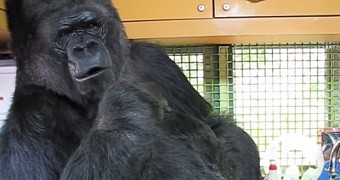Koko the gorilla has been living at The Gorilla Foundation in California for over 40 years. During this time, she's been taught sign language and even some basic English.
According to her trainer, she now understands well over 1,000 signs and around 2,000 spoken words. As impressive as these feats might be, it looks like this gorilla has another trick up her sleeve.
In a recent study published in the journal Animal Cognition, scientist Marcus Perlman, who's been closely observing Koko since 2010 when he began research work at The Gorilla Foundation, thinks the ape is also quite close to speaking.
Koko has the ability to voluntarily produce new sounds
We humans are capable of speech because we have evolved to voluntarily control our vocalizations and our breathing, Marcus Perlman says. All other species that produce sounds to communicate do so reflexively, in response to their environment, and so their chatter is not considered speech.
The general view is that, even though they are primates like ourselves, apes too produce sounds merely as a response to their environment and cannot adapt to learn new vocal behaviors, let alone do so voluntarily. Hence, they lack the ability to speak.
Except that Koko the gorilla has learned new vocal behaviors while living amongst humans.
In his report in the journal Animal Cognition, researcher Marcus Perlman describes Koko performing vocal behaviors that are not part of the usual repertoire for her species and that she could have only learned while living among humans in captivity.
The scientist says Koko can perform a total of 9 voluntarily behaviors that all requite her to control both the vocalizations she produces and her breathing. It's not talking per se, not how we have grown accustomed to it, but it's a step in the right direction nevertheless.
“Koko bridges a gap,” Marcus Perlman commented on the gorilla's behavior in an interview.
“She shows the potential under the right environmental conditions for apes to develop quite a bit of flexible control over their vocal tract. It's not as fine as human control, but it is certainly control,” the University of Wisconsin-Madison researcher went on to say.
What this study tells us about gorillas in the wild
From a biological perspective, Koko is no different to other gorillas. Consequently, Marcus Perlman suspects that she shares her knack for voluntarily vocalizations with her wild siblings. Plainly put, it might be that all apes are in fact closer to speaking than we give them credit for.
“Presumably, she is no more gifted than other gorillas,” the researcher argued in a statement. “The difference is just her environmental circumstances,” he added.

 14 DAY TRIAL //
14 DAY TRIAL // 

